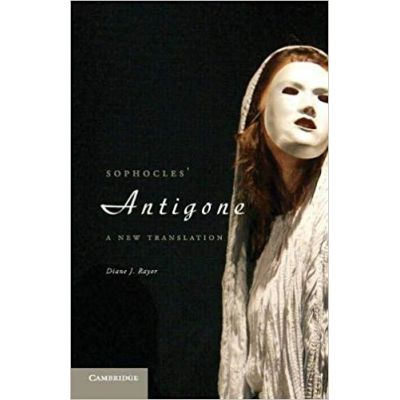Sophocles\' Antigone: A New Translation for Today\'s Audiences and Readers - Oliver A. Evans

Detalii Sophocles\' Antigone: A New Translation
Sophocles\' Antigone: A New Translation - Disponibil la libris.ro
Pe YEO găsești Sophocles\' Antigone: A New Translation de la Oliver A. Evans, în categoria Drama.
Indiferent de nevoile tale, Sophocles\' Antigone: A New Translation for Today\'s Audiences and Readers - Oliver A. Evans din categoria Drama îți poate aduce un echilibru perfect între calitate și preț, cu avantaje practice și moderne.
Preț: 37.53 Lei
Caracteristicile produsului Sophocles\' Antigone: A New Translation
Comandă Sophocles\' Antigone: A New Translation Online, Simplu și Rapid
Prin intermediul platformei YEO, poți comanda Sophocles\' Antigone: A New Translation de la libris.ro rapid și în siguranță. Bucură-te de o experiență de cumpărături online optimizată și descoperă cele mai bune oferte actualizate constant.
Descriere magazin:
This new translation of Sophocles\' Antigone, one of the cornerstones of Ancient Greek Tragedy, is meant to satisfy several parameters: (i) above all, to provide a text that can be immediately and easily understood and appreciated by a 21st century, English-speaking audience or reader, (ii) in so doing, to remain as faithful to the text and the spirit of the text as is possible, and (iii) neither to promote nor exclude flexibility in staging, choreography, and interpretation. The translator realizes that this is a task that is by its very nature impossible to perfect, and that usually the quality of any attempt is very much in the eye of the beholder. However, he strongly believes that there is an identifiable gap in affordable translations of Ancient Greek Theater, between those efforts that are virtually incomprehensible as a result of their antiquated vocabulary, awkward syntax, opaque idiom, and/or overwrought poetry, and those that take such liberty with the underlying text as to bear little relationship to the spirit of the original. Oliver Evans hopes to fill that gap, and that this translation will be enjoyed by audiences and readers alike. It is intended to be the first in a series of fresh translations of all the extant plays of Sophocles, perhaps to be followed by translations of Euripides and Aeschylus. Oliver Evans was educated at St. Paul\'s School, London, and Oxford University, where he graduated with a Double First and several awards in Classics. The play itself is, of course, the famous tragedy written by Sophocles (497-406BC) in or before 441BC. For more information on Antigone, the translator suggests starting with the entry in Wikipedia and following the references there. There is no introduction or interpretation in this edition.

Produse asemănătoare

Antigone: In a New Translation by Nicholas Rudall - Sophocles
![]() libris.ro
libris.ro
Actualizat in 28/10/2025
83.28 Lei

The Burial at Thebes: A Version of Sophocles\' Antigone - Seamus Heaney
![]() libris.ro
libris.ro
Actualizat in 28/10/2025
89.28 Lei

Sophocles\' Antigone: A New Translation - Diane J. Rayor
![]() grupdzc.ro
grupdzc.ro
Actualizat in 28/10/2025
93.86 Lei

Sophocles\' Antigone: A New Translation for Today\'s Audiences and Readers - Oliver A. Evans
![]() libris.ro
libris.ro
Actualizat in 28/10/2025
37.53 Lei
Produse marca Oliver A. Evans

Sophocles\' Antigone: A New Translation for Today\'s Audiences and Readers - Oliver A. Evans
![]() libris.ro
libris.ro
Actualizat in 28/10/2025
37.53 Lei
